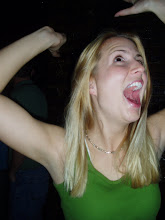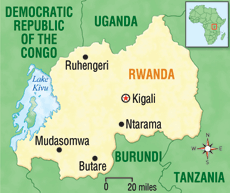I’ve experience a tornado, a hurricane, and many a blizzard back in the United States, but I had to travel all the way to Rwanda to experience (at least to my knowledge) my first earthquake. Per usual, I was on time to breakfast and sat down to the standard coffee and bread. Before I had even finished buttering my bread, there was a loud shaking, but I just assumed it was a big truck going by- only the California people knew what it was, and left the dining room immediately. Rumor has it the earthquake registered a 6.1 in Chyangugu, near the border with the Democratic Republic of Congo, but here in Butare I’m guessing (with my extensive earthquake experience) it was far less. BUT it was the largest since the earthquake here last year that killed several people- fortunately this one injured neither people nor buildings. For all you geography/geology buffs out there, the volcanoes along the DRC and Rwanda border were formed by seismic activity of tectonic plates in the region, so there may be more excitement in store for the volunteers place in the Western province.
After that bang (or, rather, quake) of a morning, came another first- my first health presentation in Kinyarwanda. The presentation was to an outreach group brought together by the nearby women’s center and actually took place in the same Catholic Church where my resource family goes to church. We (four of us) were scheduled for the very beginning of a full day on family planning and I was responsible for explaining the biology of HIV and AIDS to this group of young adults. Biology is a hard subject to explain even when you know the language and culture, so you can imagine the difficulty I had in explaining this subject in Kinyarwanda. When describing the immune system, for instance, I had to call it “the body’s way of fighting bad things.” Close, but not quite. Fortunately, the audience was very receptive to the muzungu butchering their language and explaining a concept that seems so divorced from the everyday reality of diseases like HIV and AIDS. After all four of us finished, we even had several questions, which we took as a good sign- Rwandan culture tends towards a reserved nature, so their confidence indicates that we may actually have gotten some of the information across. The presentation helped to reassure me that while communication and the community’s trust may be a struggle at first, it is indeed possible and I just might be able to achieve something once at site.

